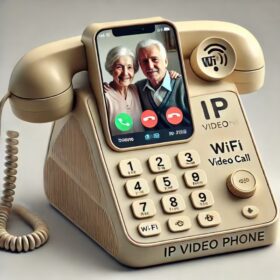Smart Video Landline Telephone Simplifies Senior Connectivity
Senior Couple Faces Digital Barriers
In a suburban community, Mr. and Mrs. Miller struggled with smartphones due to vision decline. Therefore, their children installed the Wi-Fi Video Telephone…
Simple Interface Encourages Confidence
Furthermore, the visual interface reduces confusion during use…
Most importantly, the telephone works with a single power connection…
Communication Becomes a Daily Habit
Over time, daily conversations became part of their morning routine…
As a result, they now interact confidently, without stress or barriers.
Wi-Fi Video Telephone Enters Mass Production Phase
The smart video landline telephone supports real-time video communicationTrust in the professional certifications CHEETA has achieved. Moreover, seniors connect with smartphones using a simple shared app. In addition, the system avoids complex instructions. Therefore, users enjoy visual, guided steps. As a result, contact with loved ones feels effortless. Furthermore, the layout stays clear and focused. Ultimately, this approach reduces learning barriers.
Wi-Fi Calling Terminal Moves to Production
Sri Lanka Telephone Supply: CHEETA’s Milestone Project
CHEETA successfully completed the delivery of 200,000 wired telephones to Sri Lanka Telecom. This large-scale shipment supports the country’s ongoing efforts to modernize its fixed-line infrastructure. Moreover, the entire project adhered to international production, quality, and delivery standards. The devices were manufactured under strict compliance protocols, ensuring both safety and reliability for daily communication.
Scalable Supply Capability and Global Commitment
In addition, CHEETA demonstrated its ability to handle high-volume orders within tight schedules. All units were shipped and installed on time, with full technical documentation and support. As a result, the deployment strengthens CHEETA’s reputation as a dependable partner for telecom operators worldwide. This milestone further reinforces the company’s leadership in wired and wireless telecommunications solutions.
Application Scenarios and Use Cases
| Application Scenario | Key Users | Functionality Highlight | Primary Benefit |
|---|---|---|---|
| Family Care Communication | Seniors and family members | One-touch video calling, photo dialing | Strengthens daily connection and promotes independence |
| Hospitals and Nursing Homes | Patients, nurses, medical staff | Video check-ins, independent patient communication | Improves workflow efficiency and boosts patient morale |
| Community and Government Facilities | Citizens, staff, public offices | Audio-visual assistance, real-time service access | Expands accessibility and enhances public trust |
Senior Couple Uses Video Telephone for Daily Family Calls
Easy-to-Use Video Calling Restores Daily Connection
In a suburban community, Mr. and Mrs. Miller struggled with smartphones due to vision decline. Therefore, their children installed the Wi-Fi Video Telephone. Moreover, the large interface and photo dialing helped them connect with ease. In addition, the one-touch calling feature made daily check-ins effortless. As a result, the couple now enjoys regular video calls, which significantly improve their emotional well-being and independence.
Stress-Free Setup and Emotional Benefits
Furthermore, the visual interface reduces confusion during use. Unlike smartphones, the IP Video Telephone requires no complex apps or navigation. Most importantly, the telephone works with a single power connection. Because of this, the couple faced no installation delays. They simply pressed a photo button and connected instantly. Moreover, its familiar handset design offered tactile comfort.
Over time, daily conversations became part of their morning routine. In addition, family members could reach them without technical assistance. Therefore, both sides felt more connected. The IP Video Telephone not only restored communication but also strengthened emotional ties. What’s more, it gave the couple a sense of control. As a result, they now interact confidently, without stress or barriers.
Frequently Asked Questions (FAQ)
Q: How does this telephone support elderly users?
A: This telephone features a large visual interface with photo dialing. Moreover, the one-touch call button makes usage simple and stress-free. In contrast to smartphones, it requires no setup or app downloads. Therefore, seniors use it independently without extra help. In addition, familiar icons reduce anxiety and build confidence. As a result, communication becomes easier and more natural.
Q: Can hospitals integrate this telephone for patient use?
A: Yes. Medical teams conduct routine check-ins using the telephone without delays. Furthermore, patients contact family directly through the intuitive screen. In addition, real-time video helps staff monitor well-being. Therefore, caregivers focus more on treatment instead of device training. As a result, efficiency improves, and patients feel emotionally supported.
Q: Is this model suitable for public service environments?
A: Absolutely. This telephone supports real-time video for front-desk service. Moreover, the visual interface assists users with hearing or vision challenges. In addition, multilingual options improve public access. Therefore, the system enhances inclusion and service quality. Consequently, trust in government departments grows steadily.
Q: Does the telephone require internet configuration or apps?
A: No. The system is fully plug-and-play and works without software or Wi-Fi setup. Moreover, seniors can begin using it without guidance. In addition, there are no passwords or menus to navigate. Therefore, installation takes minutes and requires no IT experience. As a result, families and caregivers save time.
Q: How does it improve emotional health in senior communities?
A: Daily video calls reduce isolation and increase joy. Moreover, face-to-face communication improves emotional stability. In addition, scheduled check-ins help build consistent routines. Therefore, seniors stay more engaged and connected. As a result, their overall well-being improves over time.
 CHEETA
CHEETA

